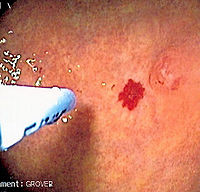
Photo from wikipedia
Abstract Background: Gastrointestinal angiodysplasias (GIAD) bleeding and obscure gastrointestinal bleeding (OGIB) are increasing health problems. Somatostatin analogues have been proposed as rescue therapy, but data for lanreotide are scarce. Objective:… Click to show full abstract
Abstract Background: Gastrointestinal angiodysplasias (GIAD) bleeding and obscure gastrointestinal bleeding (OGIB) are increasing health problems. Somatostatin analogues have been proposed as rescue therapy, but data for lanreotide are scarce. Objective: To determine the efficacy, safety and resource saving of long-acting lanreotide for GIAD and OGIB. Methods: Retrospective study including adults with GIAD bleeding or OGIB and lanreotide treatment for at least 6 consecutive months. Demographics, comorbidities and treatments were collected. Anaemia and health resource consumption were analysed and compared between the year before and three years after starting lanreotide. Complete response was defined as a lack of new blood transfusion or endovenous iron dose need. Results: Twenty-seven patients (mean age 76.8 years) were included, 63% taking anticoagulants/antiplatelets. The bleeding was attributable to angiodysplasia in 85.2%, of whom half had multi-site lesions. Lanreotide was administered for a median of 27.1 months. During follow-up of up to 3 years (mean 32.5 months), 18.5% of patients achieved complete response and around 60% a 50% reduction of health resource consumption. Haemoglobin values improved (p = .007), while admission time, blood/iron infusions, and the number of endoscopies decreased significantly (p<.05) at least up to the second year. There were no relevant side effects during the follow-up period. Conclusion: Long-term treatment with lanreotide significantly improves anaemia and decreases health resource consumption in patients with recurrent GIAD bleeding or OGIB.
Journal Title: Scandinavian Journal of Gastroenterology
Year Published: 2018
Link to full text (if available)
Share on Social Media: Sign Up to like & get
recommendations!